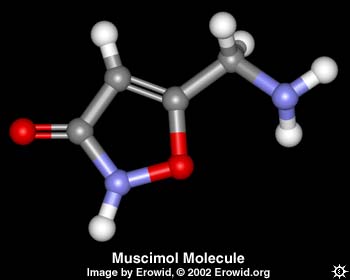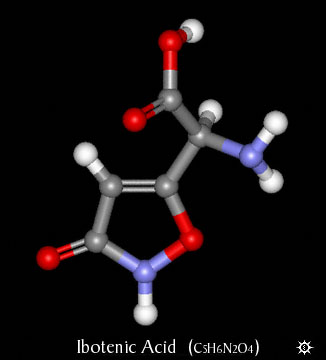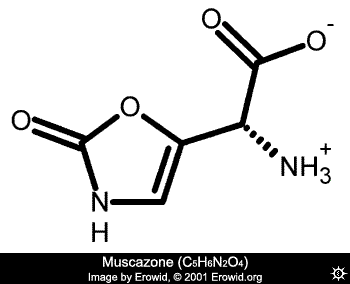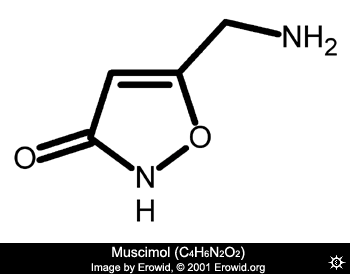by Erowid
| NAME : | Muscimol |
| CHEMICAL NAME : | 5-(Aminomethyl)-3(2H)-isoxazolone |
| ALTERNATE CHEMICAL NAMES : | 5-(aminomethyl)-3-isoxazolol, 5-aminomethyl-3-hydroxy-isaxazole |
| ALTERNATE CHEMICAL NAMES : | 3-hydroxy-5-aminomethylisoxazole; agarin, pantherine |
| CHEMICAL FORMULA | C4H6N2O2 |
| MOLECULAR WEIGHT | 114.10 |
| MELTING POINT | 175° (crystals) |
| LD50 | mice: 3.8 mg/kg s.c, 2.5 mg/kg i.p. |
| LD50 | rats: 4.5 mg/kg i.v, 45 mg/kg orally |
| From the Merck Index 12th Edition | |
|---|---|

| NAME : | Ibotenic Acid |
| CHEMICAL NAME : | alpha-Amino-2,3-dihydro-3-oxo-5-iso-xazoleacetic acid |
| ALTERNATE CHEMICAL NAMES : | alpha-amino-3-hydroxy-5-isoxazoleacetic acid |
| ALTERNATE CHEMICAL NAMES : | amino-(3-hydroxy-5-isoxazolyl)acetic acid |
| CHEMICAL FORMULA | C5H6N2O4 |
| MOLECULAR WEIGHT | 158.11 |
| MELTING POINT | 151-152° (anhydrous crystals) |
| MELTING POINT | 144-146° (monohydrate crystals) |
| LD50 | 15 mg/kg i.v., 38 mg/kg oral (mice) |
| LD50 | 42 mg/kg i.v., 129 mg/kg oral (rats) |
| From the Merck Index 12th Edition | |
|---|---|

| NAME : | Muscazone |
| CHEMICAL NAME : | alpha-Amino-2,3-dihydro-2-oxo-5-oxazoleacetic acid |
| ALTERNATE CHEMICAL NAMES : | alpha-amino-2-oxo-4-oxazoline-5-acetic acid |
| CHEMICAL FORMULA | C5H6N2O4 |
| MOLECULAR WEIGHT | 158.11 |
| MELTING POINT | |
| LD50 | |
| LD50 | |
| From the Merck Index 12th Edition | |
|---|---|


MERCK INDEX ENTRY
6391. Muscimol. 5-(Aminomethyl)-3(2H)-isoxazolone; 5-(aminomethyl)-3-isoxazolol; 5-aminomethyl-3-hydroxy-isaxazole; 3-hydroxy-5-aminomethylisoxazole; agarin, pantherine. C4H6N2O2; mol wt 114.10. C 42.11%, H 5.30%, N 24.55%, O 28.04%. Potent CNS depressant and GABA agonist isolated from Amanita muscaria (L.) Fr., Agaricaceae. Structural identity with the insecticidal substances, pantherine and agarin: Onda et al., Chem Pharm. Bull. 12, 751 (1964); Eugster et al., Tetrahedron Letters 1965, 1813; Bowden, Drysdale, ibid. 727. Synthesis: Gagneux et al., ibid. 2077; Goth et al., Helv. Chim. Acta 50, 137 (1967); Bowden et al., J. Chem. Soc. (C) 1968, 172. Improved syntheses: Nakamura, Chem. Pharm. Bull. 19, 46 (1971); P. Krogsgaard-Larsen, S.B. Christensen, Acta Chem. Scand. Ser. B B30, 281 (1976); A. Barco et al., J. Chem. Res. (S) 1979, 176; B. E. McCarry, M. Savard, Tetrahedron Letters 22, 5153 (1981); V. Jager, M. Frey, Ann. 1982, 817. Conformational structure: L. Brehm et al., ibid. 26, 1298 (1972). Industrial patents: Hafliger, Gagneux, U.S. pats. 3,242,190, 3,397,209 (1966, 1968 both to Geigy). Pharmacology: Theobald et al., Arzneimittel-Forsch. 18, 311 (1968). Review of pharmacology: F. V. DeFeudis, Neurochem. Res. 5, 1047-1068 (1980).

USE: As a molecular prove to study GABA receptors.
4922. Ibotenic Acid. alpha-Amino-2,3-dihydro-3-oxo-5-isoxazoleacetic acid; alpha-amino-3-hydroxy-5-isoxazoleacetic acid; amino-(3-hydroxy-5-isoxazolyl)acetic acid. C5H6N2O4; mol wt 158.11. C 37.98%, H 3.82%, N 17.72%, O 40.48%. Flykilling and narcosis-potentiating amino acid structurally similar to kainic acid, q.v., extracted from poisonous mushroom species. Isoln from Amanita pantherina (dc.) Fr., and A. muscaria (L.) Fr., Agaricaceae: Takemoto et al., J. Pharm. Soc. Japan 84, 1233 (1964); Eugster et al., Tetrahedron Letters 1965, 1813. Structure: Takemoto et al., J Pharm Soc. Japan 84, 1186, 1232 (1964). Syntheses: Gagneux et al., Tetrahedron Letters 1965, 2081; Sirakawa et al, Chem. Pharm. Bull. 14, 89 (1966); Kishida et al., ibid. 14, 92 (1966); 15, 1025 (1967). Improved synthesis: Nakamura, ibid. 19, 46 (1971). Industrial pats: Belg. pat 665,249, C.A. 65, 2266e (1966); Gagneux et al., U.S. pat. 3,459,862 (1965), 1969, both to Geigy); Kishida et al., Japan. pats 15,975-(68) 25,780(69) (both to Sankyo), C.A. 70, 77944p (1969); 72, 13054g (1970). Pharmaology: Theobald et al. Arzneimittel-Forsch. 18, 311 (1968); Johnston et al, Bio- chem. Pharmacol. 17, 2488 (1968). Exhibits potent neuroexcitatory activity: eidem. Nature 248, 804 (1974). Chemistry review: Eugster Fortschr. Chem. Org. Narurst. 27, 261-321 (1969); Catalfomo, Eugster, Bull. Narcotics 22, 33-41 (1970). Excitatory and possible sedative actions on spinal neurons: D.R. Curtis et at. J. Physiol. 291, 19 (1979); in cerebral cortex: E. Puil, Can. J. Physiol. Pharmacol. 59, 1025 (1981). Use as experimental neurotoxic agent: A. Contestabile et al Experientia 40, 524 (1984).
Crystals from water of methanol, mp 151-152© (anhydrous); mp 144-146© (monohydrate). LD50 in mice, rats (mg/kg): 15, 42 i.v.; 38, 129 orally (Theobald).
USE: Neurobiological tool.


